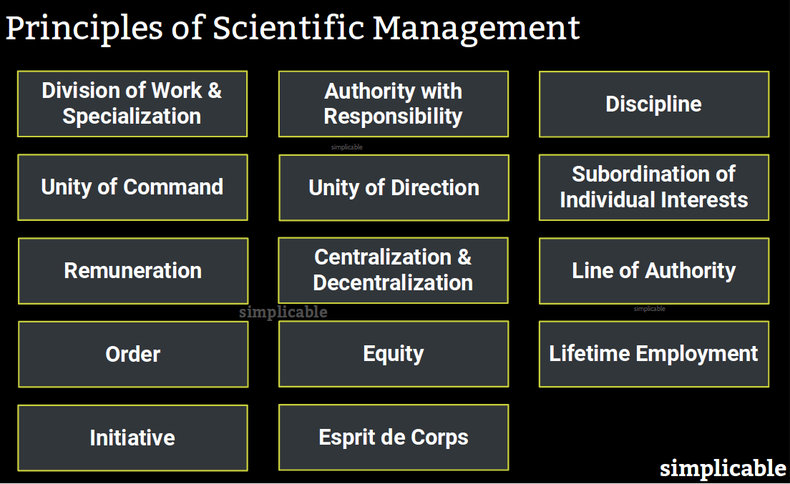
Division of Work & Specialization
Division of work is the practice of efficiently dividing work up into separate tasks so that many people can work on the same problem, potentially at the same time. Specialization is the practice of developing specialized roles that require expert knowledge in order to improve productivity.Example
A data architect designs a database and a user interface designer designs screens for the same system project at the same time. Both have highly specialized knowledge and experience that allow the tasks to be completely quickly with reasonably high work quality.
A data architect designs a database and a user interface designer designs screens for the same system project at the same time. Both have highly specialized knowledge and experience that allow the tasks to be completely quickly with reasonably high work quality.
Authority with Responsibility
Coupling of authority with responsibility so that each manager and worker has the formal authority they require to do their job. With authority and responsibility comes the accountability to answer for results.Example
A front desk manager has authority to give customers refunds or to take extraordinary steps to try to correct problems with service or rooms. With this comes accountability for customer service on their shift such that poor customer experiences reflect on their performance.
A front desk manager has authority to give customers refunds or to take extraordinary steps to try to correct problems with service or rooms. With this comes accountability for customer service on their shift such that poor customer experiences reflect on their performance.
Discipline
Employees are expected to adhere to processes, policies and procedures. They are also expected to recognize formal authority and follow direction.Example
A hotel manager asks cleaning staff to modify cleaning procedures based on recent customer complaints. The staff diligently follow this new procedure in every room they clean. Failure to follow this new procedure would be viewed as a performance problem.
A hotel manager asks cleaning staff to modify cleaning procedures based on recent customer complaints. The staff diligently follow this new procedure in every room they clean. Failure to follow this new procedure would be viewed as a performance problem.
Unity of Command
Every employee has a single manager. Henri Fayol felt this was a solution to the problem of prioritizing requests from multiple managers and avoiding inconsistent direction.Note
This principle is uncommon in large modern organizations, particularly those that produce knowledge work. Likewise, this wasn't typically implemented by large 20th century industrial firms that commonly had specialized managers who had authority over the same staff such as a line manager and quality manager.
This principle is uncommon in large modern organizations, particularly those that produce knowledge work. Likewise, this wasn't typically implemented by large 20th century industrial firms that commonly had specialized managers who had authority over the same staff such as a line manager and quality manager.
Unity of Direction
Teams have a single set of objectives that align to the objectives of the organization. Each objective is achieved with a single plan.Notes
Most modern organizations adopt a similar principle using techniques such as management by objectives whereby each employee's objectives are mapped to those of their manager up the chain of command of an organization. In practice, unity of direction is difficult to achieve as managers tend to do their own thing and cooperation is often low between managers at the same level of an organization.
Most modern organizations adopt a similar principle using techniques such as management by objectives whereby each employee's objectives are mapped to those of their manager up the chain of command of an organization. In practice, unity of direction is difficult to achieve as managers tend to do their own thing and cooperation is often low between managers at the same level of an organization.
Subordination of Individual Interests
The requirement that employees make sacrifices for the good of the organization as opposed to freely pursuing their own interests.Example
A software developer is put on-call such that they need to respond at any time of the day or night when a system has an problem whatever they are doing in their personal life. This tends to be stressful, so this responsibility is rotated on a schedule.
A software developer is put on-call such that they need to respond at any time of the day or night when a system has an problem whatever they are doing in their personal life. This tends to be stressful, so this responsibility is rotated on a schedule.
Remuneration
The principles of scientific management as proposed by Henri Fayol require workers to sacrifice their personal interests, acquire highly specialized skills and work diligently to follow direction and processes. This wouldn't be a very attractive prospect without significant remuneration that allows an employee to share in the value created by a highly efficient organization.Example
A software developer who receives special on-call pay for each 24 hour period they make themselves available for incident management.
A software developer who receives special on-call pay for each 24 hour period they make themselves available for incident management.
Centralization & Decentralization
Centralization is when a small team set strategy, goals, objectives and make decisions for an entire organization. Decentralization is when all employees make decisions because they are closest to a situation. Henri Fayol notes that their are advantages to both centralization and decentralization and suggests that both strategies be used as appropriate.Example
An airline centralizes critical functions such as flight planning but decentralizes decision making that can benefit from local knowledge such as provisioning the food in airport lounges.
An airline centralizes critical functions such as flight planning but decentralizes decision making that can benefit from local knowledge such as provisioning the food in airport lounges.
Line of Authority
Henri Fayol proposes a strictly hierarchical system of communication whereby managers only talk to their teams and teams only talk to their manager except in the case of an emergency.Notes
It is more common for rigid bureaucracies to adopt this principle than profit-seeking firms. In fact, modern firms largely reject this principle as outdated, inefficient and dangerous. It is well known that silencing employees in this way can have a chilling effect on creativity and leads to culture, compliance and legal problems. Likewise, it is far more efficient for executives to communicate to an entire organization then to pass a message down the chain of command.
It is more common for rigid bureaucracies to adopt this principle than profit-seeking firms. In fact, modern firms largely reject this principle as outdated, inefficient and dangerous. It is well known that silencing employees in this way can have a chilling effect on creativity and leads to culture, compliance and legal problems. Likewise, it is far more efficient for executives to communicate to an entire organization then to pass a message down the chain of command.
Order
Impose order on all things with systems.Example
An aircraft maintenance team has a specific place for every hand tool that makes it obvious if a tool is missing. Checklists for maintenance include a confirmation that no tools have been left behind in an engine.
An aircraft maintenance team has a specific place for every hand tool that makes it obvious if a tool is missing. Checklists for maintenance include a confirmation that no tools have been left behind in an engine.
Equity
Treating employees equally without preference that is unrelated to their abilities, capacity, position, duties and performance.Example
A firm that doesn't let managers recruit unqualified friends and give them inflated roles and compensation. This can be implemented with a system of approvals, segregation of duties and conflict of interest controls.
A firm that doesn't let managers recruit unqualified friends and give them inflated roles and compensation. This can be implemented with a system of approvals, segregation of duties and conflict of interest controls.
Lifetime Employment
Investing in the employee and providing them job security.Example
Japanese firms are known for their system of lifetime employment whereby employees are given experience in a wide range of roles over a career to prepare them for management. Managers are then given experience managing a variety of teams in preparation for executive management. In this way, a firm develops deep leadership capabilities with managers who understand the organization and industry.
Japanese firms are known for their system of lifetime employment whereby employees are given experience in a wide range of roles over a career to prepare them for management. Managers are then given experience managing a variety of teams in preparation for executive management. In this way, a firm develops deep leadership capabilities with managers who understand the organization and industry.
Initiative
Employees are encouraged to originate their own projects and ideas. This appears to conflict with unity of direction (above). This reflects Henri Fayol's pragmatic approach whereby he appears to advocate for two opposing approaches depending on the situation.Example
A manager needs to cut budget and asks their team for ideas as opposed to working in secrecy with their own ideas.
A manager needs to cut budget and asks their team for ideas as opposed to working in secrecy with their own ideas.
Esprit de Corps
The active promotion of team spirit by management.Example
Corporate funding for events, offsite meetings and activities that encourage teams to bond.
Corporate funding for events, offsite meetings and activities that encourage teams to bond.




























